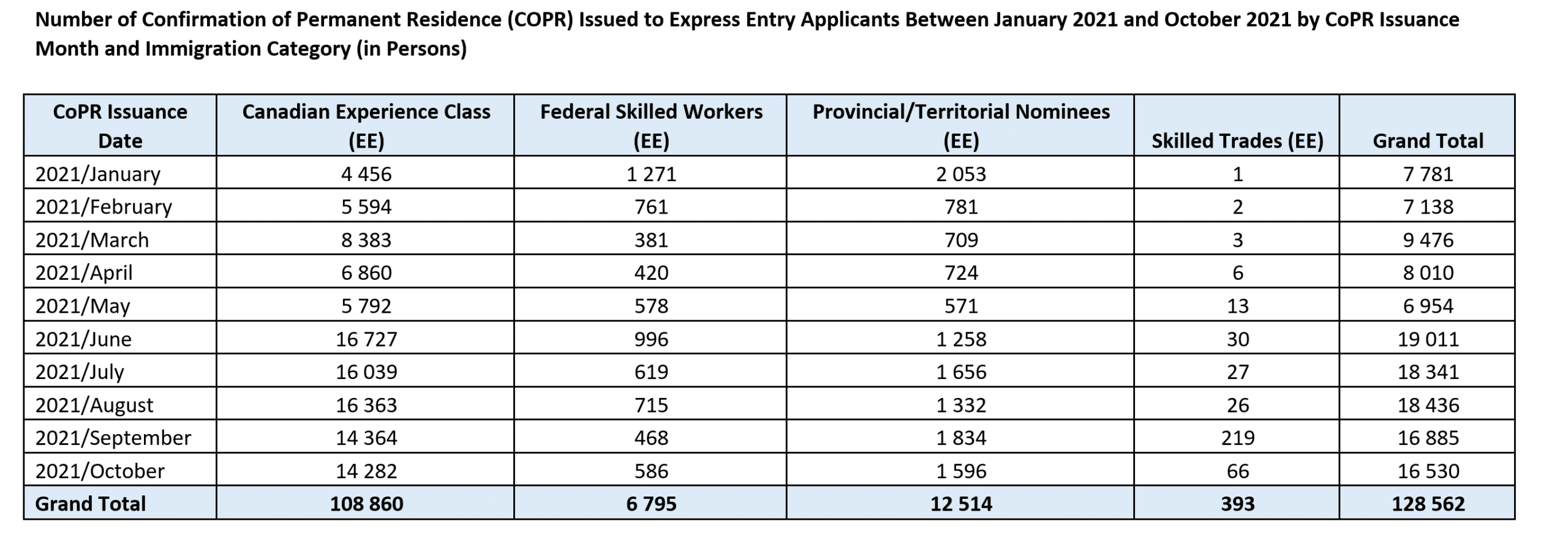The Canadian Experience Class (CEC) accounts for 85 per cent of finalized Express Entry applications in 2021.
New IRCC data shows how the department is currently prioritizing Express Entry applications.
The data represents the number of permanent residence applications submitted under Express Entry that have been approved by Immigration, Refugees and Citizenship Canada.
Express Entry is the main way Canada welcomes economic class skilled immigrants. Candidates that meet the criteria of an Express Entry program can submit their profile onto IRCC’s website. Candidates receive a Comprehensive Ranking System (CRS) score based on human capital criteria such as their age, education, language skills, and work experience. Approximately every two weeks, IRCC invites the highest scoring candidates to apply for permanent residence. Such candidates then have 60 days to submit their permanent residence application to IRCC.
Once IRCC approves the application, a candidate receives a Confirmation of Permanent Residence (COPR) which enables them to officially land in Canada as a permanent residence. The landing process can entail a COPR holder that was residing in Canada as a temporary resident converting their legal status to permanent residence.
It can also entail an individual arriving from abroad with their COPR to become a permanent resident.
IRCC has made significant changes to its Express Entry policies amid the pandemic. The department is currently pursuing a plan to land 401,000 new permanent residents this year. At the start of 2021, it made the decision to focus on transitioning more temporary residents to permanent residence to give it a better shot of achieving its 401,000 immigrant target. As a result, it has only invited Canadian Experience Class (CEC) and Provincial Nominee Program (PNP) candidates under Express Entry this year. This is a major departure from precedent since the Federal Skilled Worker Program (FSWP) accounted for some 45 per cent of successful Express Entry candidates before the pandemic.
IRCC has made this temporary shift in policy for two reasons. First, it argues that because some 90 per cent of CEC candidates currently reside in Canada during the pandemic, they are less likely to face COVID-related disruptions that would impede their ability to complete their permanent residence landings in 2021. Second, IRCC continues to invite PNP candidates to help provinces across the country address their labour market needs.
Another impact of this shift is IRCC has not been inviting the highest-ranking candidates among the entire Express Entry pool, as it did prior to the pandemic, but rather it has invited the highest-ranking CEC and PNP candidates. This has caused overall CRS cut-off scores to decline as the department aimed to invite as many CEC candidates as possible to support its immigration target for this year. The most notable draw of the year came on February 13 when IRCC invited 27,332 CEC candidates to apply for permanent residence, a feat it achieved by setting the CRS cut-off score at just 75. To put this into perspective, this draw was almost six times larger than the previous record (Express Entry has existed since 2015), and the cut-off score was nearly 400 points lower than what it usually was prior to the pandemic.
CIC News has obtained data from IRCC showing that the CEC is accounting for some 85 per cent of all finalized Express Entry applications this year. Between January and October, IRCC issued COPRs to 108,860 CEC applicants. The department has issued 12,514 COPRs to PNP candidates (about 10 per cent of all COPRs issued to Express Entry applicants this year).
The group most negatively impacted are FSWP candidates. They are recipients of just 6,795 COPRs this year. This is only 5 per cent of all COPRs issued to Express Entry candidates this year, about 9 times less than what it was prior to the pandemic.

Source: Immigration, Refugees and Citizenship Canada (IRCC).
IRCC got off to a slow start to the year as it was finalizing between 7,000 and 10,000 Express Entry applications per month through to May. In June, this nearly doubled, and IRCC has maintained a high pace of Express Entry application processing in the second half of this year. CEC candidates are by far the greatest beneficiaries of the increased processing capacity. IRCC has also increased the number of PNP applications it is finalizing but it still is not at the same level it processed for PNP candidates in January. The data suggests IRCC has diverted its resources to processing as many CEC applications as it can as it seeks to fulfil its 401,000 newcomer goal.
There has been little improvement in the number of FSWP applications processed. In September and October, IRCC finalized under 600 FSWP applications in each of those months.
IRCC indicates it currently has a backlog of 1.8 million permanent and temporary residence applications. This includes just under 100,000 Express Entry applications as of October 27. Assuming IRCC maintains its current pace, it will have processed all of the some 48,000 CEC applications remaining by January 2022. The department has indicated it would like to cut its Express Entry inventory by more than half before considering resuming invitations to CEC and FSWP candidates. This suggests IRCC will be in better position to consider broadening its Express Entry invitations in early 2022, when the Express Entry backlog is likely to be around half what it was in late October.
IRCC held 27 CEC draws this year but has paused them since September 14. Meanwhile, FSWP candidates have not been drawn from the pool since December 23, 2020. There were some 165,000 FSWP candidates in the Express Entry pool as of October 25, 2021, which means they represent some 85 per cent of all current Express Entry candidates.
IRCC is well on its way to achieving its immigration target this year. It has landed nearly 314,000 permanent residents through to October, and in recent months has been landing over 45,000 per month. The department is currently in the process of determining Canada’s immigration levels target for 2022, as well as what Express Entry strategy to pursue next year. We can expect to learn more in the coming months. Major announcements still to come include the issuance of mandate letters to each federal minister, including immigration minister Sean Fraser. In addition, Fraser will unveil Canada’s Immigration Levels Plan 2022-2024 by February 10th. The mandate letter and new levels plan will provide stakeholders with more guidance on IRCC’s policy priorities in 2022 and beyond.
Source : cicnews.com

















